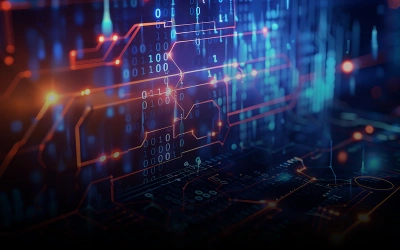Artificial Intelligence (AI) is ushering in a new industrial revolution in today's world, transforming the way industries, organisations, and their people operate, develop, and prosper. In recruitment and workforce management, AI is already making a significant impact. It helps streamline tasks, overcome challenges, make better and more reliable data-driven decisions, improve time management, and enhance planning.
Talent acquisition, retention, and development are key areas experiencing this AI revolution, particularly in how Early Careers talent is being identified and hired to build the future workforce.
Employer use of AI in recruitment
Artificial Intelligence is being integrated across various stages of the application, assessment and recruitment processes. Many global organisations, particularly in STEM industries, have embraced AI to enhance their hiring strategies.
Pfizer, for example, utilise AI to develop more precise, consistent, and job-aligned descriptions. They also use AI to determine job levelling and match CVs and applications to job expectations, resulting in more efficient, bias-free, data-driven decision-making and candidate auditing.
Similarly, Takeda leverages AI for candidate and application screening, helping to filter through the high volume of applications they receive. Jimmy Zhang, the company's V.P and Head of Global Talent, highlights how AI enables faster, more efficient hiring based on potential, reducing biases tied to name, background, or education.
Unilever, an early adopter of gamification within its recruitment processes, use AI beyond the initial candidate matching and application filtering phase. Suitable candidates participate in AI-powered video-recorded interviews, where responses, word choice, tone, and facial expressions are meticulously analysed. This process narrows the initial pool of around 45,000 candidates to a final 300, achieving a 25% higher offer rate and an 82% acceptance rate.
However, despite these successes, 2024 research by candidate assessment software developers Willo revealed that 45% of employers believe technology in hiring should be used cautiously, ethically, and in support of human processes, not as a complete replacement.
Employer use of AI in early careers recruitment
The use of Artificial Intelligence in Early Careers recruitment is growing rapidly among employers. A 2023 report indicated that 28% of Institute of Student Employers (ISE) members utilised AI in their Early Talent hiring processes, a significant increase from 9% in 2022. Furthermore, nearly half (45%) expected entire processes to be conducted online within five years, citing increased speed and efficiency as key benefits, especially for managing larger application volumes and identifying top candidates.
Among the UK’s Top 100 Graduate Employers, nearly all use online application processes, with many conducting initial screenings, interviews, and assessments online. Consequently, an Early Career candidate's first human interaction might not occur until their first interview, which is increasingly held online rather than face-to-face.
This shift presents potential implications for both recruiters and candidates. While AI can efficiently handle many screening and assessment tasks, it may not fully capture a candidate's potential beyond their educational background and qualifications. Practical skills, creativity, and personality traits may be overlooked. This could result in high-quality candidates missing out on opportunities or employers selecting candidates who meet criteria on paper but lack the practical skills necessary for the role.
In Early Talent recruitment, incorporating a supportive, human-based approach is essential. Providing candidates with opportunities to engage with people throughout the process allows them to feel more comfortable and better able to showcase their abilities.
Balancing artificial and human intelligence in application processes, particularly in Early Talent recruitment, is therefore crucial to ensuring a comprehensive evaluation of candidates.
Potential ED&I impacts of AI
Regardless of which stage an employer chooses to implement Artificial Intelligence in its recruitment processes, potential Equality, Diversity, and Inclusion (ED&I) implications must be considered. It is crucial to recognise who is more comfortable with AI in application processes, with existing data offering insights into AI adoption in daily life.
For instance, Pew Research found significant disparities in AI awareness among different groups. Approximately 40% of Asian individuals had high awareness of AI, compared to only 14% of Black individuals. The research also showed that more men (38%) had high AI awareness than women (23%), and those most comfortable with AI were aged 18-29 (35%) or 30-49 (38%). Additionally, those with higher levels of AI awareness were more likely to have higher education or come from higher income backgrounds.
Therefore, employers using AI in their recruitment and daily processes need to be mindful of its impact on people from various demographics. This awareness ensures that all individuals can effectively navigate the application process and highlight their skills. Failure to consider these factors could result in less diverse and lower-skilled talent pools and workforces in the future.
For more AI industry insights, click here. If you’ve got thoughts on AI – positive or negative – we’d love to hear them! Reach out here, or comment on our social posts to start an open dialogue.







